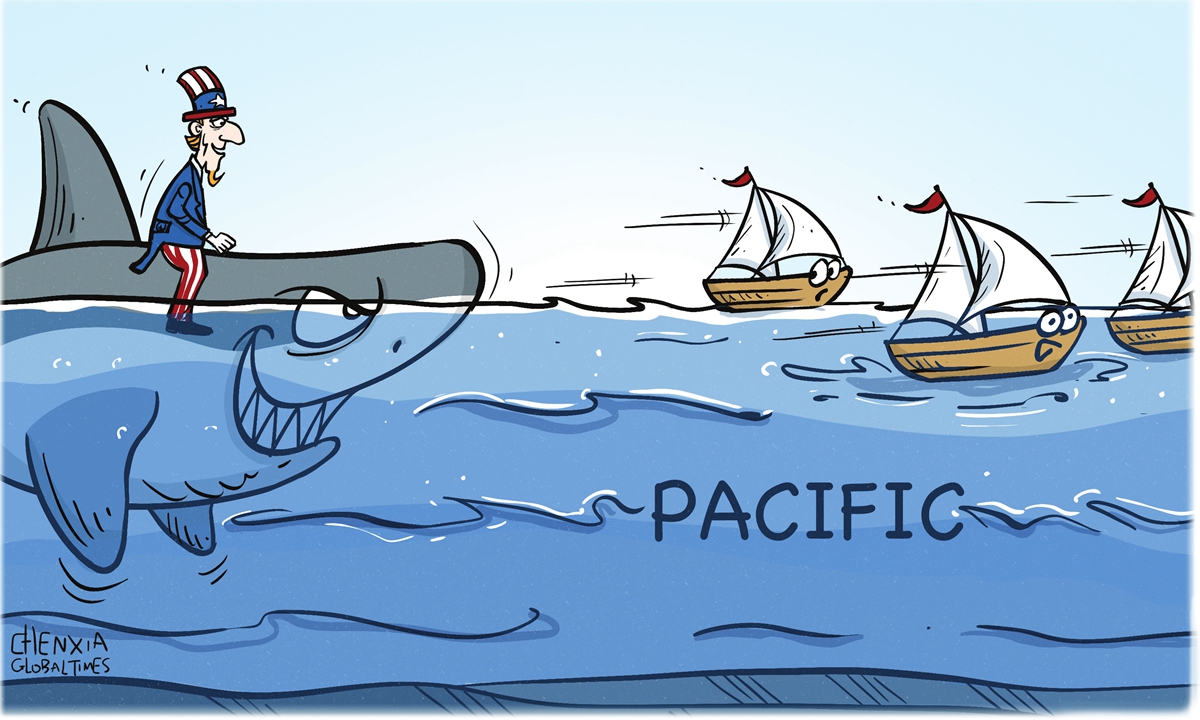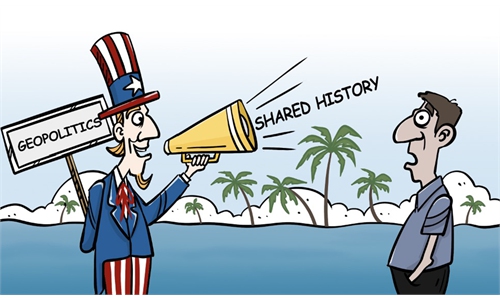US coercion will ultimately lead to strong opposition from people of Australia, Pacific Island Countries

Illustration: Chen Xia/Global Times
On Monday, US Secretary of State Antony Blinken began his trip to Tonga, New Zealand, and Australia, while on Tuesday local time, Defense Secretary Lloyd Austin departed Washington on a multiday trip to the Indo-Pacific region, including Papua New Guinea. Austin will join Blinken in Australia to attend this year's Australia-US Ministerial Consultations (AUSMIN).
The South Pacific tour of the two high-ranking US officials coincides with "Talisman Sabre 2023," the joint military exercise conducted by the US and Australia along with 11 other partner countries.
The recent couple of years have seen Washington paying unprecedented and extraordinary attention to the Pacific region. Alongside high-level visits, the US has also been promising prodigious sums of financial aid to countries in the region which it used to overlook or ignore. Previously deserted diplomatic missions were reopened while new ones were unveiled in eye-dazzling succession.
Apparently, the US has afforded a brand-new strategic role to the Pacific Island Countries (PICs) as well as its partners in the region, Australia and New Zealand. Blinken and Austin expect to rein in the US' allies and pressure them further onward in the orbit of Washington's anti-China strategy.
The recent two US administrations have been feverishly advancing the "Indo-Pacific strategy," which is purported to contain, deter and disrupt China's development. Given its declining economic power, Washington has resorted to the desperate tactic of rallying its allies and partners to act as pawns for the US hegemony. It contrives to coax and coerce countries in the Asia Pacific to align with it under its ideological banner, and spearhead the anti-China campaign.
What the US has miscalculated about is the fact that for all its sugar-coated seduction with political and economic enticements, countries in the region have their own national political wisdom and judgment when making strategic decisions.
Australia, New Zealand, and the Pacific Island countries are vigilant enough to see through the US' maneuvers to induce them to serve its own hegemonic interest, reluctant to be pulled into Washington's chessboard of its self-interested power game.
Washington has taken for granted that Canberra will always obediently go along with its commands and demands; it has obviously misjudged the situation. As a sovereign and independent country, Australia of course has to prioritize its own national interests. In particular since the Labor government under Anthony Albanese took office in May last year, Australia has no longer been unquestioningly compliant to Washington's whims at all its expenses as the previous Morrison administration.
Although New Zealand is a member of the Five Eyes alliance, Wellington has historically maintained a sensible stance toward the US' impositions. In the 1980s, New Zealand, as a member of the Treaty on the Nuclear Non-Proliferation, refused to allow US warships possibly carrying nuclear weapons to dock at its ports, resulting in the US imposing suspension on New Zealand's inclusion in the ANZUS pact.
Last month, New Zealand's Prime Minister Chris Hipkins successfully visited China. According to Hipkins, both countries enjoy a very constructive and positive relationship, which is incredibly important for New Zealand. Wellington evidently has been adhering to its sovereignty and strategic autonomy when dealing with diplomatic and security matters.
Furthermore, as the US has been persistently pulling together political, security and economic cliques to counter China, the South Pacific has been designed to ostracize cooperation with China.
At last year's summit between the US and leaders and representatives from 14 Pacific Island states, Washington alleged that the region must stave off China's "economic coercion." Empty promises of further aid were made with the hope to procure the countries' allegiance. Rumors and propagandistic fabrications such as the "debt trap" and "China threat" have continued to be propagated, attempting to lure the South Pacific countries away from their to-date successful and mutually beneficial cooperation with China.
This malicious ploy, as a matter of fact, underestimates the wisdom of the governments and people in South Pacific countries. What the South Pacific countries need to tackle are the existential crisis posed by climate change and the economic difficulties they have been suffering, rather than the non-existent "China threat." Therefore, the US' baiting and coercion, driven by explicit political purposes, will ultimately result in the strong opposition from the peoples in the Pacific.
The US and its allies have long been engaged in political manipulation in the region, with the purported aim to impose its own political and economic will on the PICs. More often than not, US aid programs are camouflaged instruments of political influence to shape and reshape the local political landscape.
In contrast, China's relationship with countries in the South Pacific region has always been based on the principle of mutual respect, mutual trust and mutual benefit. China's assistance to the countries has significantly improved the local infrastructure, speeded up the economic development and elevated the people's livelihood with tangible fruitful outcomes and enduring benefits.
Manasseh Sogavare, Prime Minister of the Solomon Islands, concluded his visit to China earlier this month, during which nine important agreements and memorandums were signed between the two countries. The cooperation between China and the Solomon Islands, as well as other PICs, has reaped substantial benefits, setting a good example for the South-South cooperation in today's world which aspires peace and development.
The author is a professor and executive director of Asia Pacific Studies Centre at East China Normal University. opinion@globaltimes.com.cn

